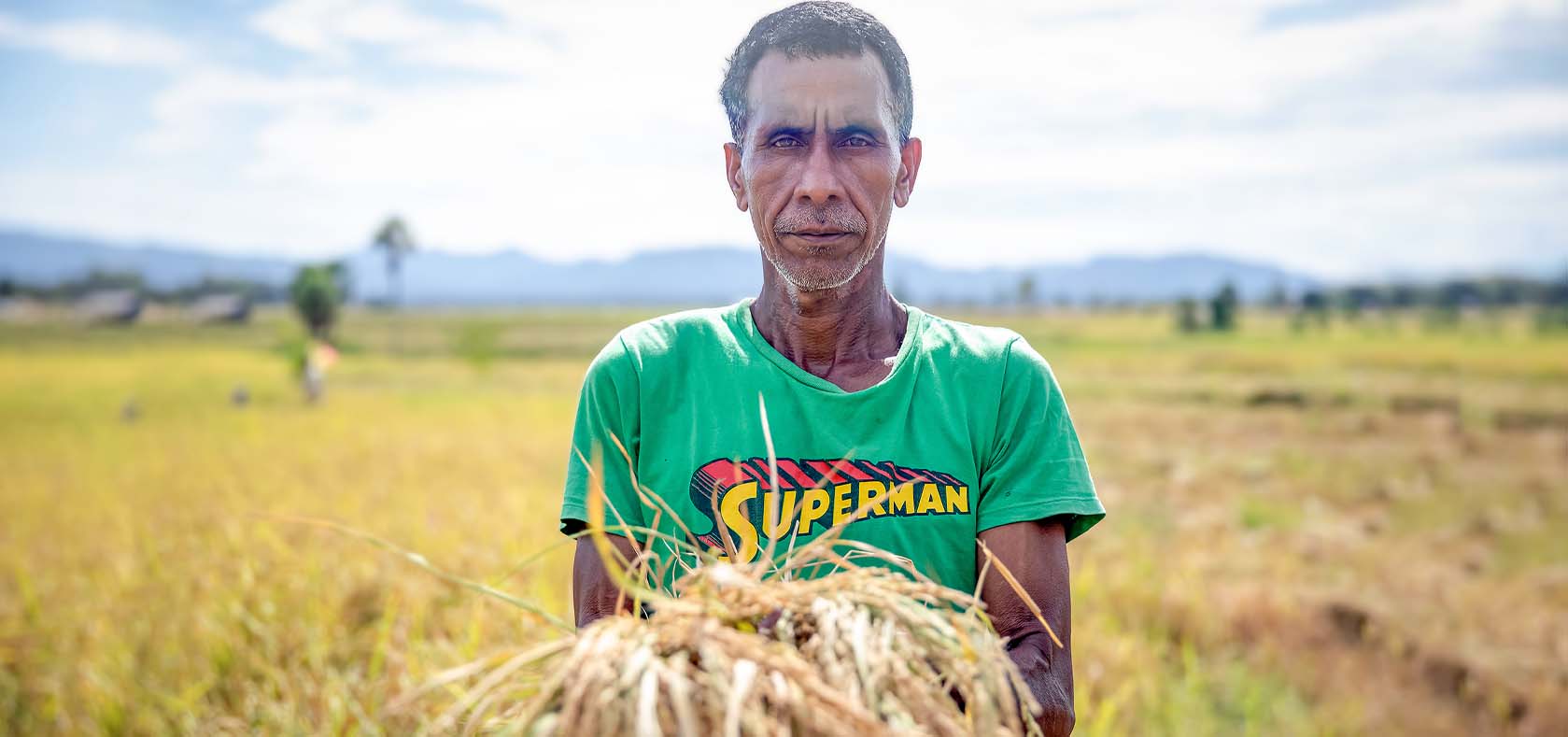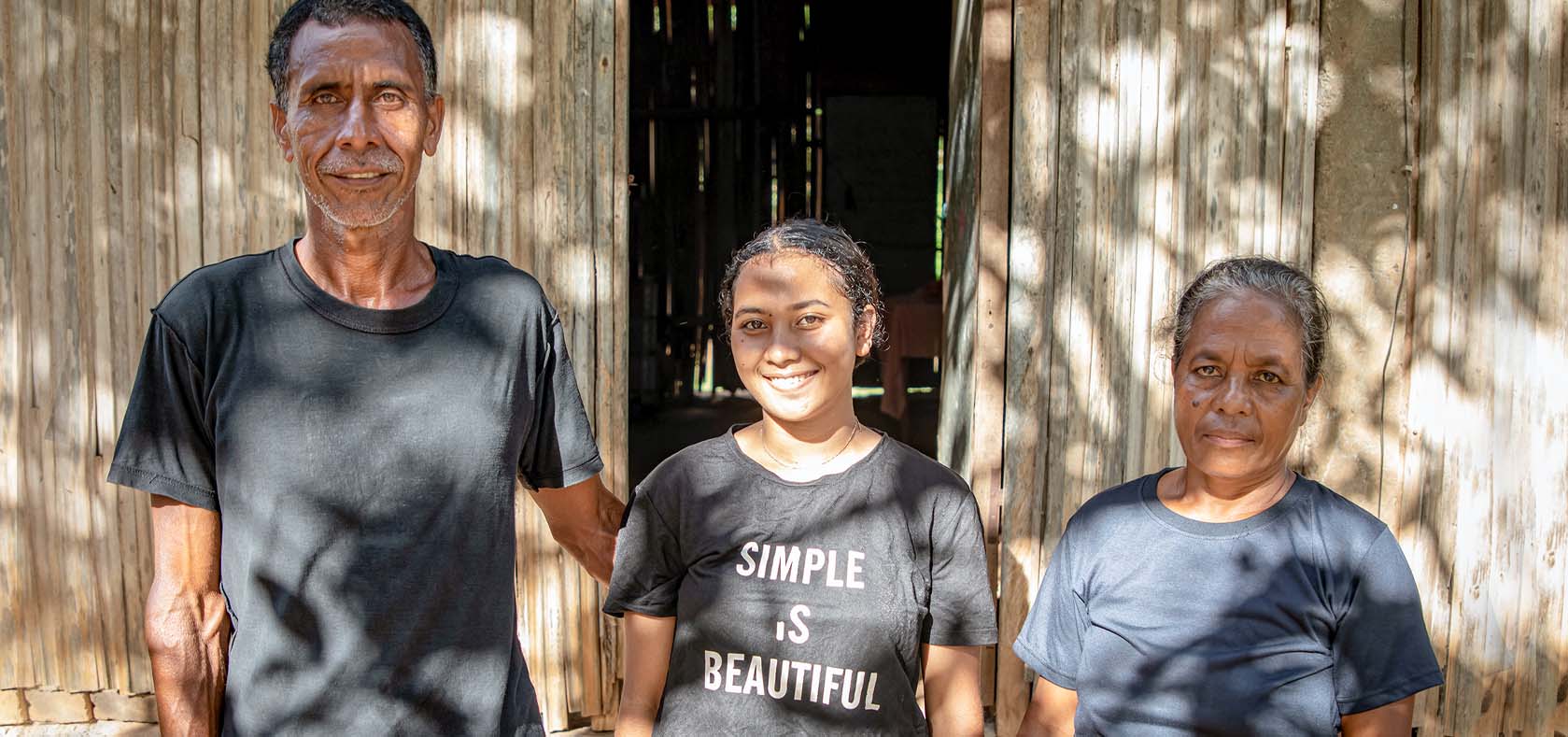In a municipality in Timor-Leste, a father is taking action to prevent violence
Date:
Author: Sylvio Da Fonseca
 Bento Pereira in his family-owned paddy field harvesting rice. Photo: UN Women/Jaime Luis
Bento Pereira in his family-owned paddy field harvesting rice. Photo: UN Women/Jaime LuisBento Pereira is a farmer in a rural community located south-west of Timor-Leste’s capital Dili. Together with his four sons, daughter and wife, they have become a fine example of how gender-equitable parenting and the development of heathy relationships leads to the prevention of gender-based violence (GBV). But this shift in attitude and behaviour were not an overnight journey for Bento, for in his community of Maliana, the municipality of Bobonaro, harsh disciplining has been and remains the norm.
He is among the 450 parents across three municipalities (Bobonaro, Viqueque and Ermera) to have benefited from the Connect with Respect (CWR) programme implemented by Alola Foundation and Mane ho Vizaun Foun under the EU-UN Spotlight Initiative since February 2021. The programme provided training to parents on positive parenting, where they learn critical skills for developing respectful family and gender-equitable relationships. These skills include: understanding social factors and harmful norms that perpetuate GBV; the mechanisms for preventing GBV; and building communication skills to improve parent-children bonds and power dynamics.
In Timor-Leste, violence against women and girls is prevalent, with 34 percent of women experiencing physical or sexual violence between the ages of 15 and 49. GBV is not the only societal problem affecting relationships within Timor-Leste’s families. There are also widespread norms regarding child-rearing and discipline that can be harmful to children, often disproportionately affecting girls. The “Parenting Education Programme to Improve Developmental Outcomes for Disadvantaged Children and Adolescents in Timor-Leste”, has found that 83 percent of parents believe that it is sometimes necessary to frighten or
threaten their children to make them behave, and 46 percent believe that physical punishment is the way to educate a child properly.
The CWR programme rolled out in October 2021. After completing 10 sessions of positive parenting training, Bento stated “With the activities, I learned that instilling gender equal values in our children at home is crucial as this will determine how they will treat women and girls throughout their lifetime.”
Seven months later, still a firm believer in gender equality, Bento shared that the CWR programme has given him new insights. He insisted that this programme should continue to expand to isolated areas to reach more people who lack knowledge on the dangers of GBV.
 Bento Pereira with his daughter and wife in his house in Maliana, Bobonaro municipality. Photo: UN Women/Jaime Luis
Bento Pereira with his daughter and wife in his house in Maliana, Bobonaro municipality. Photo: UN Women/Jaime Luis“It is going great at home,” Bento said. “My kids know that they are all special and we value them equally. My wife and I share the responsibilities equally to our children, like you can see here, helping to harvest rice is one tough job and primarily considered a male’s responsibility but my daughter and sons come to help when they can. It is the same at home, there is no gendered responsibility.” His daughter Laura Pereira, who is the youngest child and only daughter agrees. “Being the only girl is normally hard as you are burdened with all the work just because you are a girl,” she said. “I am happy we are brought up equally.”
Traditionally, women and girls are served last in family meals. Bento sees this as a potential to cause conflict among family members and chooses not to apply it at home.
Aside from this, Bento shares that his messages on respectful relationships have not only inspired change in his household but are also reaching the ears of his community. “When we support the habit of using slurs and communicating disrespectfully at home, it becomes normal to our children, and they will do the same when interacting with others. In the end, what this will continue to contribute to is violence.”
“The community here is ingrained with traditional norms that often perpetuate gender-based violence. Although it takes time to undo this, it is possible to combat it when we are aware of the prevention measures. I am delighted to have participated in the training,” Bento said with content.
Iha munisipiu ida iha Timor-Leste, aman ida foti asaun atu prevene violénsia
Data: Wednesday, 18 May 2022
Autór: Sylvio Da Fonseca
 Bento Pereira iha nia familia nia natar koá hare. Photo: UN Women/Jaime Luis
Bento Pereira iha nia familia nia natar koá hare. Photo: UN Women/Jaime LuisBento Pereira sai hanesan agrikultór ida iha komunidade rural lokaliza iha sudoeste hosi Timor-Leste nia kapital Dili. Hamutuk ho nia oan mane na’in haat, oan feto ida no feen, sira sai ona ezemplu diak ba oinsá parentalidade ho maneira jéneru ekuitativu no kria relasaun ne’ebé saudavel bele prevene violénsia bazeia ba jéneru (VBJ). Maibe mudansa ba atitude no komportamentu ne’e laos dalan fasil ida ba Bento, tamba iha ninia komunidade iha Maliana, munisipiu Bobonaro, fó disiplina ne’ebé duru ba oan sira sai ona no sei nafatin sai norma ida ba komunidade sira.
Nia sai ona nudar aman ida hosi inan-aman hamutuk 450 hosi munisipiu tolu (Bobonaro, Viqueque no Ermera) ne’ebé hetan ona benefisiu hosi programa Halo Ligasaun ho Respeitu ne’ebé implementa hosi Fundasaun Alola no Mane ho Vizaun Foun liuhosi Uniaun Europeia no Nasoins Unidas nia Inisiativa Spotlight dezde Fevereiru 2021. Programa ida ne’e fornese formasaun ba inan-aman sira kona-ba parentalidade pozitivu, ne’ebé inan-aman sira aprende abilidade kritiku sira atu dezenvolve familia respeitozu no relasaun ne’ebé jéneru ekuitativu. Abilidade hirak ne’e inklui: komprende fator sosial no normas ne’ebé hamosu VBJ; mekanismu sira atu prevene VBJ; no dezenvolve abilidade komunikasaun atu hadiak inan-aman no oan sira nia ligasaun no oinsá poder bele afeita ema nia relasaun.
Iha Timor-Leste, violénsia hasoru feto no labarik feto sei nafatin domina, 34 pursentu feto esperiénsia violénsia fíziku no seksuál ho idade entre 15 no 49. VBJ laos deit problema sosial ne’ebé afeita familia sira nia relasaun iha Timor-Leste. Normas kona-ba tau-matan ba oan no maneira atu fó disiplina ne’ebé ladiak ba labarik sira sei nafatin iha, ida ne’e dalabarak liu fó impaktu att ba oan feto sira. Estudu hosi “Parenting Education Programme to Improve Developmental Outcomes for Disadvantaged Children and Adolescents in Timor-Leste” hatudu katak 83 pursentu inan-aman fiar katak dalaruma presiza duni atu hatauk ka amiasa oan sira atu halo sira komporta an ho diak, no 46 pursentu fiar katak kastigu fíziku mak dalan diak atu eduka oan sira.
Programa Halo Ligasaun ho Respeitu komesa iha Outubru 2021. Hafoin kompleta ona sesaun 10 ba formasaun parentalidade pozitivu, Bento hateten "Ho atividade sira ne’ebé ami halo, hau aprende katak hametin valor igualdade jéneru ba ita nia oan sira iha uma-laran importante tebes, tanba ida ne'e sei determina oinsá sira sei trata feto no labarik feto sira durante sira nia moris tomak."
Liu tiha fulan hitu, sei firme nafatin atu suporta igualdade jéneru, Bento fahe katak programa Halo Ligasaun ho Respeitu loke ona hanoin foun ba nia. Nia hatutan katak programa ida ne'e tenke kontinua habelar ba fatin izoladu sira atu to'o ba ema barak ne'ebé ladun hatene kona-ba perigu hosi VBJ.
 Bento Pereira hamutuk ho nia oan feto no feen iha sira nia uma iha Maliana, munisipiu Bobonaro. Photo: UN Women/Jaime Luis
Bento Pereira hamutuk ho nia oan feto no feen iha sira nia uma iha Maliana, munisipiu Bobonaro. Photo: UN Women/Jaime Luis“Agora buat hotu lao diak loos iha ami nia uma,” Bento dehan. “Hau nia oan sira hatene katak sira espesiál no ami valoriza sira hanesan hotu. Hau nia feen ho hau fahe responsabilidade ne’ebé hanesan ba ami nia oan sira, hanesan agora dadaun ita bele haree iha ne’e, ajuda atu koá hare ne’e servisu todan ida no dalabarak ema konsidera hanesan mane sira nia responsabilidade, maibe hau nia oan feto no oan mane sira sempre mai ajuda bainhira sira bele. Ida ne’e lolos kedas situasaun iha ami nia uma-laran, ami la fahe responsabilidade ne’ebé bazeia ba jéneru. Bento nia oan feto Laura Pereira, ne’ebé sai hanesan nia oan feto ikun no oan feto mesak mos konkorda. “Sai feto ne’e dalabarak susar tebes tamba ita sempre hetan responsabilidade atu halo servisu hotu kedas tamba deit ita feto,” nia dehan. “Hau kontente tebes tamba ami nia maun-alin sira hetan tratamentu hanesan deit.”
Tradisionalmente, feto no labarik feto sira hetan serve ikus liu bainhira familia sira han hamutuk. Bento haree ida ne'e hanesan poténsia atu hamosu konflitu entre membru familia sira no hili atu la aplika iha nia uma-laran.
Aleinde ne'e, Bento fahe katak ninia mensajen kona-ba relasaun ne'ebé respeitozu laos deit inspira mudansa iha ninia uma-laran maibe nia komunidade mos rona ona. "Bainhira ita suporta toman att ida ne’ebé uza liafuan ladiak no komunikasaun ne’ebé la ho respeitu iha uma, ida ne'e sai hanesan normal ona ba ita nia oan sira no sira mos sei halo tuir bainhira sira koalia ho ema seluk. Ikus liu, ida ne’e sei nafatin kontribui ba violénsia.”
“Komunidade iha ne’e toman ona ho normas tradisional sira ne’ebé dalabarak suporta atu hamosu violénsia bazeia ba jéneru. Maske ida ne’e presiza tempu barak atu muda, ida ne’e sei posivel atu kombate bainhira ita iha koñesimentu kona-ba oinsá atu bele halo prevensaun. Hau kontente tebes tamba partisipa ona iha formasaun ne’e,” Bento hateten ho kontente.